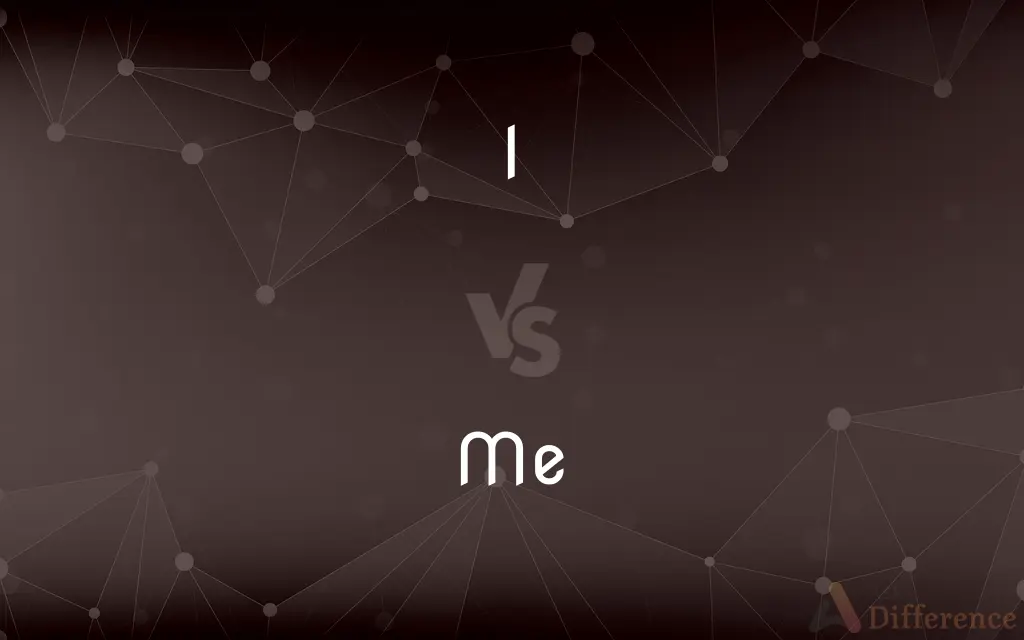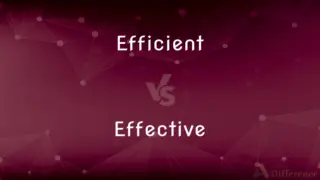I vs. Me — What's the Difference?
By Tayyaba Rehman — Updated on October 3, 2023
I is a subject pronoun; Me is an object pronoun. I performs an action; Me receives an action.

Difference Between I and Me
Table of Contents
ADVERTISEMENT
Key Differences
I is utilized as a subject pronoun in sentences, which means it stands in for the doer of the action. Me, on the other hand, is used as an object pronoun, making it the receiver of the action.
In grammatical structures, I is always paired with a verb that it's governing. Me is used after the verb, indicating the action is done to it.
To exemplify, "I gave the book to John" showcases I as the subject performing the action. Conversely, in "John gave the book to me," Me is the object receiving the action.
A common error is to use I where Me is appropriate and vice versa. For instance, "Me and Jack went to the store" is incorrect; it should be "Jack and I went to the store."
For reflexive actions where the doer and the receiver are the same, "myself" is used, not I or Me. For example, "I did it myself."
ADVERTISEMENT
Comparison Chart
Pronoun Type
Subject Pronoun
Object Pronoun
Function
Performs the action
Receives the action
Position
Before the verb
After the verb
Example Usage
I read the book.
She gave the book to me.
Common Mistake
Incorrect: Me and her are friends.
Incorrect: He gave it to John and I.
Compare with Definitions
I
Subject pronoun used for the person speaking
I am going to the store.
Me
Receiver of the action in a sentence
He told me a secret.
I
Represents the doer of an action
I cooked dinner.
Me
Used for emphasis in certain constructs
Only me and her knew the truth.
I
Paired with a verb to form a statement
I love chocolate.
Me
Can follow prepositions
Between you and me, this is a bad idea.
I
Used to express personal opinions
I think it's a great idea.
Me
Incorrectly used in place of 'I' in common errors
Me and him went to the park.
I
I, or i, is the ninth letter and the third vowel letter of the modern English alphabet and the ISO basic Latin alphabet. Its name in English is i (pronounced ), plural ies.
Me
Used by a speaker to refer to himself or herself as the object of a verb or preposition
Do you understand me?
Wait for me!
I
Used by a speaker to refer to himself or herself
Accept me for what I am
Me
Used in exclamations
Dear me!
I
The ninth letter of the alphabet.
Me
A medical condition of unknown cause, with fever, aching, and prolonged tiredness and depression, typically occurring after a viral infection.
I
The Roman numeral for one.
Me
As the direct object of a verb.
Can you hear me?
I
(in metaphysics) the subject or object of self-consciousness; the ego.
Me
Myself; as a reflexive direct object of a verb.
I
The ninth letter of the modern English alphabet.
Me
As the object of a preposition.
Come with me.
I
Any of the speech sounds represented by the letter i.
Me
As the indirect object of a verb.
He gave me this.
I
The ninth in a series.
Me
Myself; as a reflexive indirect object of a verb; the ethical dative.
I
Something shaped like the letter I.
Me
As the complement of the copula (be or is).
It wasn't me.
I
The self; the ego.
Me
As the subject of a verb.
Me and my friends played a game.
I
Nonstandard spelling of I
Me
As the subject of a verb.
I
I, the ninth letter of the English alphabet, takes its form from the Phœnician, through the Latin and the Greek. The Phœnician letter was probably of Egyptian origin. Its original value was nearly the same as that of the Italian I, or long e as in mete. Etymologically I is most closely related to e, y, j, g; as in dint, dent, beverage, L. bibere; E. kin, AS. cynn; E. thin, AS. þynne; E. dominion, donjon, dungeon.
Me
(music) The solfeggio syllable used to indicate the flat of the third note of a major scale.
I
In our old authors, I was often used for ay (or aye), yes, which is pronounced nearly like it.
Me
The person speaking, regarded as an object; myself; a pronoun of the first person used as the objective and dative case of the pronoum I; as, he struck me; he gave me the money, or he gave the money to me; he got me a hat, or he got a hat for me.
Me rather had my heart might frrl your loveThan my unpleased eye see your courtesy.
I
As a numeral, I stands for 1, II for 2, etc.
Me
A state in New England
I
The nominative case of the pronoun of the first person; the word with which a speaker or writer denotes himself.
Me
Object pronoun referring to the speaker
Give the book to me.
I
A nonmetallic element belonging to the halogens; used especially in medicine and photography and in dyes; occurs naturally only in combination in small quantities (as in sea water or rocks)
I
The smallest whole number or a numeral representing this number;
He has the one but will need a two and three to go with it
They had lunch at one
I
The 9th letter of the Roman alphabet
I
Used of a single unit or thing; not two or more;
`ane' is Scottish
I
Refers to oneself in contrast to others
You went to the party, but I did not.
Common Curiosities
Is "Me and him went" correct?
No, it should be "He and I went."
Where should I use Me in a sentence?
Use Me as an object pronoun, typically after the verb.
Can I start a sentence with Me?
Usually not, as Me is an object pronoun.
What type of pronoun is I?
I is a subject pronoun.
Why can't I say "between you and I"?
The correct phrase is "between you and me" because prepositions require object pronouns.
Is it wrong to say "Give it to I"?
Yes, it should be "Give it to me."
Can I use I in reflexive form?
Yes, but it becomes "myself."
Why do people say "Me too" and not "I too"?
"Me too" is colloquially accepted, though not strictly grammatical.
Can I use I in a compound subject?
Yes, like in "My friend and I."
Can I use Me for emphasis?
Yes, in structures like "Only me and him knew."
Why is I always capitalized?
It's a convention in English for the pronoun I to always be capitalized.
Do I always use I before the verb?
Typically, yes, as I is a subject pronoun.
In "She is taller than I/me," which is right?
Both can be used. "She is taller than I" is formal, while "She is taller than me" is commonly accepted.
Is "It is I" or "It is me" correct?
Both can be used, but "It is I" is more formal.
What's the main difference between I and Me?
I is a subject pronoun; Me is an object pronoun.
Share Your Discovery

Previous Comparison
Obliged vs. Obligated
Next Comparison
Efficient vs. EffectiveAuthor Spotlight
Written by
Tayyaba RehmanTayyaba Rehman is a distinguished writer, currently serving as a primary contributor to askdifference.com. As a researcher in semantics and etymology, Tayyaba's passion for the complexity of languages and their distinctions has found a perfect home on the platform. Tayyaba delves into the intricacies of language, distinguishing between commonly confused words and phrases, thereby providing clarity for readers worldwide.














































